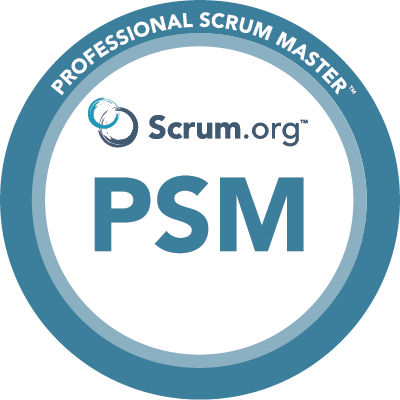Professional Scrum Master I (PSM I) Certification: A Comprehensive Guide

Introduction to the PSM I Certification
Overview
The Professional Scrum Master I (PSM I) certification, offered by Scrum.org, is an internationally recognized credential that validates an individual’s knowledge and understanding of the Scrum framework. Launched in 2009 by Ken Schwaber, one of Scrum’s co-creators, Scrum.org has since certified over 700,000 professionals globally through its various Scrum certifications. PSM I is the entry-level certification in the Professional Scrum Master series and is designed to assess an individual’s understanding of Scrum theory, roles, events, and artifacts.

Key Facts
- Date Launched: 2009
- Founder: Ken Schwaber
- Number of Certified Professionals: Over 700,000 globally
- Global Recognition: The PSM I certification is valued by employers worldwide and is a key credential for those looking to work in Agile environments.
Target Audience
PSM I is aimed at Scrum Masters, team leads, project managers, and anyone working with Scrum. It’s especially beneficial for professionals aiming to work in Agile roles or lead Scrum teams in diverse industries such as IT, marketing, finance, and product development.
Certification Objectives and Learning Outcomes
Core Learning Objectives
The PSM I certification is designed to ensure that candidates fully grasp the fundamental concepts of Scrum, including:
- The Scrum framework, its roles, events, and artifacts.
- How to support Scrum Teams in delivering maximum value.
- The Scrum Master’s role in facilitating team dynamics and removing obstacles.
- Applying empirical process control and Agile values to solve complex problems.

Skills and Knowledge Gained

Through the certification, professionals will gain:
- A deep understanding of Scrum principles and how to apply them effectively.
- The ability to facilitate Scrum events such as Sprints, Sprint Retrospectives, and Daily Scrums.
- Skills in servant leadership to guide teams towards self-management and continuous improvement.
- Proficiency in identifying and addressing team dysfunctions to foster a productive work environment.
Benefits to Professionals
- Career Advancement: PSM I certification opens doors to Agile project management roles, including Scrum Master, Agile Coach, and Project Lead.
- Enhanced Employability: Certified Scrum professionals are in high demand across industries, with job postings frequently requiring Scrum certification as a key qualification.
- Salary Increases: Studies show that PSM-certified professionals earn on average 20-30% more than their non-certified counterparts.
Detailed Breakdown of the Certification Process
Steps to Certification
- Pre-requisites: While there are no formal prerequisites, it’s highly recommended that candidates have a basic understanding of Scrum. Completing the Scrum Guide (available for free on Scrum.org) and attending a Professional Scrum Master course are helpful.
- Training Requirements: Formal training is not required but strongly encouraged. Scrum.org offers various training options, including two-day workshops and online modules led by Professional Scrum Trainers (PSTs). These courses provide hands-on experience with Scrum and better prepare candidates for the PSM I exam.
- Exam Format:
- Number of Questions: 80
- Question Type: Multiple-choice and true/false
- Time Limit: 60 minutes
- Passing Score: 85%
- Retake Policy: Candidates who fail can retake the exam after purchasing another attempt.
- Certification Levels: Scrum.org offers three levels of Scrum Master certification:
- PSM I: Validates fundamental Scrum knowledge.
- PSM II: Focuses on advanced Scrum practices and team dynamics.
- PSM III: Validates mastery of Scrum in complex team and organizational settings.
- Recertification: PSM I certification is valid for life and does not require renewal, making it a one-time investment.

Key Benefits of the Certification for Organizations

Impact on Teams and Organizations
Organizations with PSM I-certified professionals benefit from improved team collaboration, increased project success rates, and more efficient project delivery. Scrum Masters trained under this certification can help teams adapt to changing requirements and deliver projects in shorter, iterative cycles.
Real-World Application
At companies like Google and BMW, PSM-certified professionals have been instrumental in reducing project delivery times by 30%, improving cross-functional collaboration, and increasing overall team velocity. Scrum has been especially effective in helping teams respond to changing market conditions swiftly.
Industry Recognition
PSM I is recognized by leading companies such as Microsoft, Amazon, Cisco, and IBM, all of which prioritize hiring Scrum Masters with this certification. This global recognition makes PSM I one of the most trusted and valuable credentials in Agile project management.
Case Studies
At Spotify, the implementation of Scrum, led by PSM-certified Scrum Masters, resulted in 25% faster product development cycles and a notable improvement in team morale. Another example is Siemens, where Scrum Masters helped facilitate an Agile transformation that reduced defects in software development by 40%.
Certification Costs and Value Proposition
Cost of Certification
The PSM I exam costs $150. While formal training is not mandatory, Scrum.org’s Professional Scrum Master courses typically range from $1,000 to $1,500, depending on the provider.
Return on Investment (ROI)
The ROI for PSM I certification is substantial. Professionals who complete the certification report an average salary increase of 10-15% within their first year of becoming certified. Additionally, PSM-certified Scrum Masters often secure leadership roles in Agile transformations, enhancing their career trajectory.
Financial Aid and Discounts
While Scrum.org does not offer financial aid, many training providers offer group discounts for companies certifying multiple employees. Organizations that sponsor training often benefit from reduced rates for large teams.

Comparison with Other Certifications

Competitor Analysis
PSM I is often compared to certifications like the Certified ScrumMaster (CSM) offered by Scrum Alliance and the SAFe® Scrum Master certification from Scaled Agile. While both CSM and PSM I focus on Scrum, PSM I is widely regarded as being more rigorous due to its higher passing score requirement (85%) and the fact that no training is mandatory.
Unique Features
PSM I stands out because of its lifelong validity (no recertification required) and framework-agnostic approach, which allows professionals to adapt their Scrum knowledge to any industry or project type. Unlike the CSM, which requires renewal every two years, PSM I is a one-time investment.
Industry Trends
As companies increasingly adopt remote work and Agile at scale, certifications like PSM I are becoming more relevant. The PSM I focuses on servant leadership and building high-performing, distributed teams, making it ideal for professionals working in global, digital-first environments.
Success Stories and Testimonials
Case Studies
Intel used PSM-certified Scrum Masters to streamline its product development processes, achieving a 20% reduction in time-to-market for new innovations. In another example, Airbnb saw significant improvements in team efficiency, with Agile transformations led by PSM-certified leaders resulting in 35% faster decision-making.
Personal Success
Amanda Johnson, a PSM I-certified Scrum Master at Deloitte, shared how the certification helped her move from a junior project manager role to leading Agile transformations across multiple teams. “The PSM I certification gave me the confidence and tools I needed to facilitate real change.”
Notable Companies
Leading companies such as Siemens, SAP, Ericsson, and Dell all require or prefer PSM I certification for their Scrum Masters, further solidifying its value in the job market.

The Future of Agile and This Certification

Emerging Trends
As Agile practices evolve, certifications like PSM I are adapting to meet the challenges of Agile at scale, remote team management, and AI-powered project management tools. PSM I remains highly relevant, offering skills that are increasingly essential for modern project teams.
Future Updates to the Certification
Scrum.org continually reviews and updates the PSM I exam to reflect the latest industry practices. Future updates may include more emphasis on remote Scrum facilitation and the use of Agile metrics to improve team performance.
Relevance in a Changing Market
As businesses face more complex project environments and fast-changing market conditions, the need for certified Scrum Masters will continue to grow. PSM I helps professionals stay relevant by equipping them with the skills to manage highly adaptive, cross-functional teams in industries undergoing digital transformation.
Conclusion
The PSM I certification is a powerful credential that opens the door to numerous opportunities in Agile project management. Whether you are looking to advance your career or help your organization succeed, the Professional Scrum Master I certification is an investment that offers significant value in today’s dynamic business landscape.